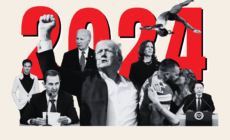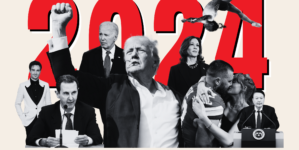-
What Your Xmas Gift Says About Your Marriage, According to Experts - 9 mins ago
-
Year in Review: What Moment Defined 2024? Newsweek Writers’ Verdicts - 44 mins ago
-
Encountering Italy and Germany on a Road Trip Through Southern Brazil - 51 mins ago
-
America’s Most Popular Christmas Movies Revealed - about 1 hour ago
-
How Netflix’s ‘Culinary Class Wars’ Made Chef Anh Sung-jae a Star - 2 hours ago
-
Dodgers Considering Blockbuster Trade For Luis Robert Jr. - 2 hours ago
-
How to Keep ‘People Pleasing” From Ruining Your Finances - 2 hours ago
-
Federal Judge Sets Court Date After NASCAR Appeals 23XI Racing And FRM Lawsuit Milestone - 3 hours ago
-
Inside the Final Days of the Assad Regime in Syria - 3 hours ago
-
College Football Playoff: Texas Eliminates Clemson, Will Play Arizona State in Peach Bowl - 3 hours ago
The VP Debate Offered Civility, but Few Solutions on Health Care | Opinion
The vice presidential debate stood in stark contrast to the chaotic exchanges of their running mates, offering a more civil, welcome tone. Despite the measured rhetoric, health care—the one issue that touches every American—received little air time.
While the candidates sparred over Obamacare, prescription drug prices, and reproductive rights, deeper concerns about health care access and systemic inequities were largely absent from the debate stage. Even with affordability ranking as a top public concern, according to a Kaiser poll, the debate left voters without meaningful solutions, more division, and no clear plan for the future of care in America.
Bankrupted by health care is a growing fear with 74 percent of Americans expressing they’re “very” or “somewhat worried” they can’t afford unexpected medical bills. They’d be right, as medical debt is the No. 1 cause of personal bankruptcy with an estimated $88 billion headed to national collections.

Matt Rourke/AP Images
Seeing a doctor or treating a life-threatening disease isn’t the same for every American. A professor of pediatrics at Nationwide Children’s Hospital recently described the plight of health care to me as a glazed donut on a plate. At its center are marginalized inner cities and around the outskirts are underserved, rural communities that live far away from health services.
The rest of us? We’re the sweet pastry, residing in the suburbs with 401(k)s, insurance, and the convenience to drive into the city to receive exceptional care. It’s easy for us, and hard for them.
It’s precisely the empty donut hole and the desolate plate that require our collective attention. Both experience lower-income levels and higher rates of chronic disease, along with limited access to services.
For signs of progress, you just need to look toward the rolling hills of Perry County, Ohio and the vibrant corridor of Chicago, Ill. Two lawmakers, representing rural and urban Americans, offer hope that bipartisan, congressional efforts still happen.
Congresswoman Robin Kelly (D-Ill.) and congressman Troy Balderson (R-Ohio) launched the Digital Health Caucus to bridge the rural-urban divide with the aim to improve health care outcomes and to ensure Americans benefit from the transformative power of technology.
The advent of virtual care is one way to break down access barriers. The technology creates a digital connection to reach latent, rural, and underserved communities, and offers a building block for people to regain control of their health. It’s affordable, available at your fingertips, and can prevent common symptoms from turning into unnecessary ER visits.
Where’s our national virtual health care strategy, Mrs. or Mr. Future President?
America’s fragile health care system is getting pressure tested. Today, the average wait time to see a doctor is 26 days for new patients, exacerbated by a shortage of doctors which has created a severe supply and demand imbalance. But this is America, where free-market dynamics turn our troubles into triumphs. Right? It’s not that simple, as health care is uniquely difficult.
Walmart’s recent exit from primary care is a cautionary tale. An ambitious plan to bring health care closer to people in states like Georgia and Florida, the national retailer faced reimbursement challenges and uncontrollable costs, resulting in the closure of 51 clinics and a shutdown of its national virtual care network.
The fact that Walmart, atop the Fortune 100, cannot turn a buck in health care is a wakeup call.
With 11,000 Americans aging into Medicare each day, we need more disruptors to forge new models for how care is accessed and delivered. Failure is inevitable, but market shakeups stimulate competition and drive improvements that benefit for-profit health systems, small federally funded clinics, and Americans of all stripes.
As the national election intensifies, I’m reminded of the adage, “Good medicine is often bitter.” Effective policies are often unpopular, but left unchecked, today’s opaque pricing structures, antiquated billing processes, administrative red tape, and monopolistic practices will lead to more of the same.
Americans are ready to ditch the divide for an adult conversation about how we collectively move forward, and healing our nation starts with fixing health care. We need remarkable leadership willing to find common ground because our strength depends on our collective health.
Derek Streat is founder of DexCare.
The views expressed in this article are the writer’s own.
Source link






















